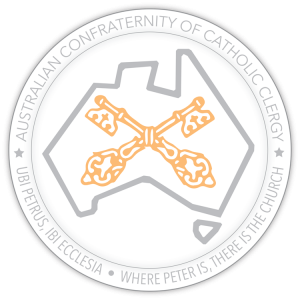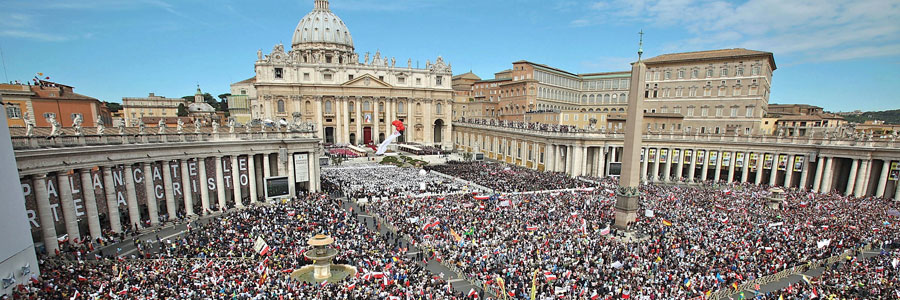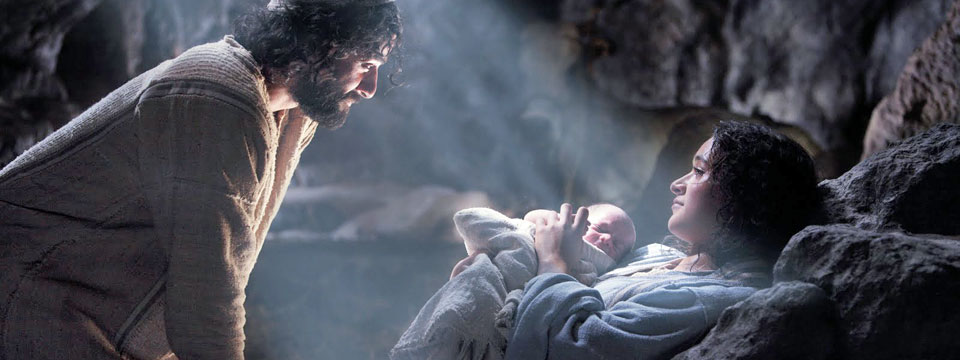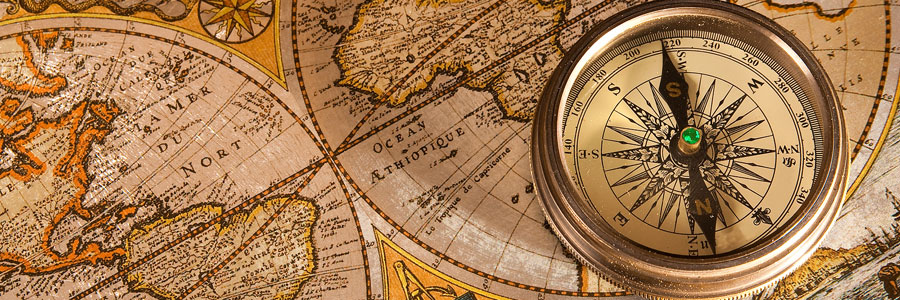Believing in history
I’d like to start with a proposition. Here it is: To be a Christian is to believe in history. Now, what do I mean by that? Well, I can tell you what I don’t mean. I don’t mean the “history of progress”, which has been the guiding faith in the West for many years. The cult of “progress” claims that things are getting better all the time. That thanks to science and technology, the human condition is constantly improving. That our future is open to unlimited material achievements. I have real problems with that sort of myth. I don’t see any evidence that it’s true. But that’s another talk for another time.
To be a Christian is to believe in history. I mean this in the way the great Catholic historian, Christopher Dawson, meant it. Dawson wrote: “Christianity, together with the religion of Israel out of which it was born, is a historical religion in a sense to which none of the other world religions can lay claim.” Think about the Bible. All the great world religions have sacred books. The Qu’ran, the Bhagavad-Gita; the Analects of Confucius. What all the sacred texts of other religions have in common is that they’re essentially wisdom literature. They’re collections of often wise and noble teachings aimed at helping believers live ethically and find the right path to peace or happiness or enlightenment.
Bible as history
The Bible also aims to make people wise. But it also seeks to lead them to salvation, which is much more than “enlightenment”. Its starting point is totally different. The first words are: “In the beginning ….” The Bible begins with a step-by-step report of the first day in the history of the world. The entire Old Testament is like that. After telling us about the first man and woman and their descendants, it proceeds to present a historical account of God’s chosen people, the children of Israel. We read about their captivity in Egypt; their deliverance and wandering to the promised land; the rise and fall of their kingdom; their exile and restoration. The biblical narratives are filled with dates and geography, even the names of foreign rulers.
The New Testament continues that history, focusing on one particular child of Israel, Jesus of Nazareth, and the community he founded, the Church. The story is told with lots of references – some direct, others subtle – to that earlier history. Jesus is portrayed as fulfilling all that God promised in the Old Testament. The Church is described as the new people of God, the final realisation of Israel’s calling to be God’s light to the nations. Again, throughout the New Testament, we’re given precise historical markers. Here’s how the Gospel of Luke introduces the ministry of John the Baptist: “In the fifteenth year of the reign of Tiberius Caesar, when Pontius Pilate was governor of Judea, and Herod was tetrarch of Galilee and his brother Philip tetrarch of ….” You get the idea.
To be a Christian means believing very definite things about history and about our own respective places in history.
Historical specificity of our religion
We don’t just profess belief in the Incarnation. We say we believe that God took flesh at a precise moment in time, and in a definite place. That’s the reason for that odd detail in our Creed. Think about it: We’re the only religion to remember our founder’s executioner by name every time we profess our faith. In fact, I don’t think there’s another profession of faith in any religion that mentions specific historical personages.
Pontius Pilate and Mary are mentioned by name in the creed. Why? The reference to Mary, his mother, guarantees Christ’s humanity. The reference to Pilate, who condemned him to death, guarantees his historicity. It ensures that we can never reduce the Incarnation to an abstract concept, a metaphor, a pretty idea. It ensures that we can never regard Jesus Christ as some kind of ideal archetype or mythical figure. He was truly a man and truly God. And once he had a place he called home on this earth.
God’s action in history: salvation
Something else, too. We believe that this historical event, which happened more than 2,000 years ago, represents a personal intervention by God “for us and for our salvation.” God entered history for you and me, for all humanity.
These are amazing claims. Again, all of them are unique to Christianity among the world religions. The four noble truths of Buddhism don’t have anything to do with history. The Muslim profession of faith, the shahada, testifies simply that there is no God but God and that Muhammad was his messenger. To the degree that Islam has a historical narrative, it was arguably borrowed from and built on the Jewish-Christian narrative that came before it.
That’s my first point today. To be a Catholic is to be very unique among the world’s believers. To be a Catholic means believing that you are a part of a vast historical project. And it’s not our project. It’s God’s. Being Catholic means believing that since the beginning of time God has been working out his own hidden purposes in the history of nations and in the biography of every person. He’s still unfolding his purposes today, and each of us here has a part to play in his divine plan.
Our part in the divine Plan
“He chose us before the foundation of the world, to be holy. In love, he destined us for adoption to himself through Jesus Christ” (Eph 1:4). St. Paul wrote that to the first Christians. He meant those words for us, too. Before the foundation of the world, God had each of us in mind. He made us out of love. He made us for a reason. To be holy, to be his sons and daughters through Jesus Christ. To help him in his plan to share his love with the whole world.
In his first homily as Pope, Benedict XVI said the same thing. He said: “We are not some casual and meaningless product of evolution. Each of us is the result of a thought of God. Each of us is willed, each of us is loved, each of us is necessary.” This is a wonderful truth. Each of us is the result of an act of the creative imagination of God.
Again, no other religion makes anywhere near these kind of claims about the meaning of human life – and not just “human life” in general, but each and every human life. God willed each of us to be here. He loves us personally. But how can the Pope say we are necessary? What does God need or want us to be doing? Let’s go back to the Creed for a minute.
We believe the Incarnation was a real historical event. For our salvation, Jesus came down from heaven at that point in history when Pilate was Caesar’s man in Judea. And we believe that event changed everything. It’s the centre and meaning of history. Everything before that was but a prologue and a prelude. But what about everything after that? Well, that’s where we come in.
The Church as Christ present among us
The Creed not only tells us about the past. It also speaks of the future. We believe Jesus Christ will come again in glory to usher in a kingdom that will have no end. We anticipate that kingdom in every Eucharist, when he comes to us under the appearances of bread and wine. We live in joyful hope for the coming of the “end” of history – when “time no longer shall be,” as the Book of Revelation says.
Until that day, we live in the era of the Church. If the Incarnation represents the past and the Second Coming represents the future, the Church is always the “present” tense of God’s plan for history and for each of our lives.
Now, there’s a lot of confusion about the Church – about what it is and what it’s for. That too, is another talk for another time.
But simply put, the Church is Jesus Christ risen and alive and working in the world through me and through you. Paul said Christ is “one flesh” with the Church, like a man and woman become one flesh in marriage. We are the Church. In a mystical unity with Christ, we make up the family of God and the kingdom of God. And the Church we see on earth is united inseparably to the Church we can’t see in heaven, the communion of saints.
The Church continues the mission of Christ
What’s the Church for? To continue Christ’s mission on earth, the mission of his Incarnation. The mission of love. We’re here to proclaim God’s love and the good news of Jesus Christ to the ends of the earth. We’re here to make disciples of all nations.
In all this, we have Christ’s promise that he will be with us until the end of the age. And he is. Through the Holy Spirit that guards the truth of what the Church teaches. Through the Eucharist and sacraments that sustain and sanctify us on our journey in this world.
A lot of people don’t “get” these connections between the divine and the human, the invisible and the visible, the spiritual and the material. And that leads to a lot of problems. We hear people all the time saying they’re upset with “the Church.” Or that “the Church” has let them down. Or that “the Church” has distorted Christ’s message and needs to be reformed.
I agree with these people. I’m not satisfied with the Church either. I want the Church to be more holy. I want the Church to purge all the corrupting influences of sin, temptation, and worldliness. I want to the Church to be fearless in love, courageous in confronting evil, and eloquent in bearing witness to the Gospel in a culture of greed and despair.
But what those people are really complaining about is the clergy. Their definition of “the Church” includes only the visible leadership of the Church; the Pope, the Cardinals, the archbishops and bishops, the priests. That’s the Church they want to criticise, shake up and turn around.
I’m glad they hold bishops and priests, including me, to high standards. We should be leading holy lives that are an example for the Church. I only wish these people would remember that the Church includes them, too. When Christ said, “Be perfect as our Father in heaven is perfect”, he wasn’t talking only about the clergy. When he said, “Go and preach the Gospel to all nations,” he wasn’t talking only about religious professionals. The demands of holiness and radical discipleship apply to every one of us. No excuses. No exceptions.
The Church as human and divine
One of my inspirations was the French Catholic writer, Georges Bernanos. He’s most famous for a great novel that I strongly recommend to you, The Diary of a Country Priest. Bernanos was a true prophet of the last century. One of the many things he got right was his thinking about the Church and what it means to be Catholic. He knew the Church in this world was never meant to be a society of the perfect.
He wrote: “The visible Church is not only the ecclesiastical hierarchy. She is you, she is me – which means the Church is not always a pleasant thing. At times it’s even been a very unpleasant thing to have to look at the Church up close.”
Bernanos knew that if the Church was already holy and perfect, there’d be no place in it for sinners like you and me. He wrote: “Instead of feeling at home, you would stop at the threshold of this congregation of supermen, turning your cap in your hands, like a poor beggar at the door of the Ritz.”
The Church is always going to look messy if you only look at the human element. Parliament looks messy. Corporate boardrooms look messy. But remember, unlike those human institutions, the Church is also supernatural and divine. In the Church we encounter Jesus Christ, the Son of the living God. We hear his word of forgiveness in the confessional. We have communion with his body and blood in the Eucharist.
The whole edifice of the Church – her structures, her teachings, her devotions and sacraments – exists to bring us into contact with Jesus Christ. And through that contact, to transform us into the people that God has created us to be. The Church exists to transform sinners – ordinary men and women like you and me – into saints. This is no ordinary human institution. In fact, there’s never been anything like the Catholic Church in the history of the world. And there won’t be.
The renewal begins with ourselves
No question about it: the Church needs to be renewed, revitalised. That’s why we’re here today. We need to understand what Jesus Christ wants from us. What I suggest to you is this: the renewal of the Church begins inside each one of us. If the Church isn’t what we want the Church to be, it’s because you and I aren’t yet the people that Jesus Christ has called us to be. All of this leads to my second point today. As Catholics, you have an “ecclesial” being and identity. The Church is where you belong. It’s where God has called you to be. In the Church you will find God’s will for your life.
St Maximilian Kolbe said that “Every man and woman in this world is assigned a mission by God.” That’s true. It’s the teaching of the Apostles, Popes and Saints. But can we really believe it? Do you really believe that God has a mission, some special task that he has given you – and only you – to carry out in this world? Do you really believe that you are necessary to God’s plan for human history? What possible divine mission could St. Maximilian have been fulfilling in giving up his life for a Jewish prisoner in the Nazi death camp at Auschwitz? Well, the same mission that God gives to each of us: to be holy. To live as children of God. To love as Jesus loved, in all of the unique circumstances of our individual lives. And by our love to spread the love of God to the ends of the earth.
And our mission is love
That brings us to my third point: to be a Catholic is to be a missionary. A missionary of God’s love. We think of missionaries as people like Matteo Ricci, the Jesuit who sailed off to evangelise China in the 16th century. But most us are called to be missionaries in a much more ordinary and local way – in our homes, neighbourhoods, and workplaces. We’re called to be what Madeleine Delbrêl used to call “missionaries without a boat”. Madeleine Delbrêl is a great story. As a teenager she was a militant atheist who with great seriousness wrote manifestos like, “God Is Dead. Long Live Death!” But through reading and later, prayer, she came to understand not only that God is real, but also that he had a plan for her life. She returned to the Church. In the years before World War II she went to live in an experimental communist city outside of Paris, known as Ivry-sur-Seine. Madeleine lived there the rest of her life, working every day shoulder-to-shoulder with avowed atheists who despised the Church. She became famous for her love and sacrifices for the poor. And she never tired of talking to people about the source of her great love – Jesus Christ. Madeleine said: “Mission means doing the very work of Christ wherever we happen to be. We will not be the Church, and salvation will not reach the ends of the earth, unless we help save the people in the very situations in which we live.”
That’s your mission. To help save the people you come in contact with in your everyday lives – your spouses and children, your coworkers, neighbors and friends.
We’re not living in an atheist environment like Madeleine Delbrêl. We’re living in an environment that’s much worse. In fact, in your society and in mine, and throughout Western Europe, we hear talk that this is a “post-Christian moment” in history. That’s a polite, academic way of saying that most people go about their days as if the Incarnation never happened.
In his last book, Memory and Identity, which he finished shortly before his death in 2005, Pope John Paul II warned about this. He wrote: “Again and again we encounter the signs of an alternative civilisation to that built on Christ as ‘cornerstone’ – a civilisation which, even if not explicitly atheist … is built upon the principle of thinking and acting as if God did not exist.”
That’s what we’re up against. An alternative civilisation. The most powerful nations on earth are organised and operating as if they have no need for God. “Practical atheism” has become a world religion. So what are you going to do? How are we going to convert this world? To get to my last point, I want to suggest an answer from history.
Practical Christianity in a godless world
Did you ever wonder how the early Church did it? I mean, how did a handful of men and women, disciples of an obscure man executed as a criminal, wind up changing the world – conquering an empire and founding a whole new civilisation on the cornerstone of that executed man’s life and teachings? In just a few centuries, without firing a single shot?
I was talking to priests earlier about a little book called The Rise of Christianity. It’s by one of the world’s leading social scientists, Rodney Stark. What’s interesting about Stark is that he’s a self-professed atheist. Unlike a lot of atheists, he’s got no axe to grind against the Church. That’s refreshing. But he’s also not about to buy the idea that the Church was successful because it was God’s will for the world. Those are claims he can’t prove as a scientist. So he set out to study the material, historical and sociological “reasons” for Christianity’s success.
Do you know what he concluded? That the Church conquered the empire by the force of her beliefs and teachings. Because people practised what the Church preached. It was that simple. People lived out their faith. And that living out of their faith had revolutionary consequences.
The most radical Christian belief, Stark said, was the belief in God’s love and the commandment to love our neighbours as ourselves. Today, we take these beliefs for granted. They’re clichés today. But originally they marked something very new in the history of religion.
Stark puts it this way: “The simple phrase, ‘For God so loved the world …’ would have puzzled an educated pagan. And the notion that the gods care how we treat one another would have been dismissed as patently absurd.”
The practice of God’s love for people
Never before had a religion taught that God loved people personally, and that God’s love began before the person was even born. Abortion and birth control were rampant in the Roman Empire. Christians rejected it all from the beginning. Why?
Athenagoras, a Christian layman, explained why in an open letter he addressed to the Emperor Marcus Aurelius. He said: “For we regard the very foetus in the womb as a created being, and therefore an object of God’s care.” He wrote that in the year 176. Can anyone have any doubt about what he might write to your Parliament today regarding embryonic stem cell research? Can anyone have any doubt about what you should write to them?
Before Christianity came on the scene, no religion had ever taught that God could be found in our neighbour. The world ignored the poor, the hungry, the stranger and the imprisoned. It still does. And yet Jesus said that we find God in our love for these least brethren of ours.
Stark shows how the early Christians’ love had concrete consequences that enabled the faith to spread and grow. And I want to leave you today with my last point: that divine love remains the most revolutionary idea in the world today.
And the power of God’s love for people
Dorothy Day, the founder of the Catholic Worker movement back in the USA, said God became man to show men and women a new way to be human. “He came to serve,” she said, “to show the new Way, the way of the powerless. In the face of Empire, the Way of Love.”
We are not powerless in the face of today’s unbelieving and alternative civilisation. We can turn this world upside down if only we’re willing to love – the kind of Christian love that is vastly more than just a warm feeling; the kind of love that breaks us open into something entirely new; the kind of love that bears fruit in our personal zeal, courage, justice, mercy and apostolic action.
So I leave you with this: Love well. Put your belief into practice. Do everything for the love of God, even the little things you have to do each day. Love those who don’t love you. Love expecting nothing in return. Love and you will find Jesus. Love and those you love will find Jesus, too. Love, and through your actions, God will change this world.
One of my favorite stories about Mother Teresa is about the time she found a woman on the streets who was covered in sores that were dirty and infected and crawling with insects. Mother Teresa took her in and began cleaning her up. All the while, the woman was screaming at her, showering her with curses and insults.
At one point the woman screamed: “Why are you doing this? People don’t do things like this. Who taught you?” Mother Teresa said, “My God taught me.” The woman quieted down and asked who was her God. Mother Teresa responded: “You know my God. My God is called love.”
My friends, our God is called Love. And our God is calling you to follow Him in remaking the face of the world.





